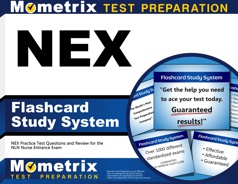The Nursing Entrance Exam (NEX) is used by nursing schools to determine if an applicant has the skills and aptitudes necessary to do well in a program of nursing education.
Take a free NEX practice test by clicking “Start Test” above!
NEX Exam Outline
The NEX contains 163 multiple-choice questions, 18 of which are unscored, and you will be given 3 hours to complete it (60 minutes per section).
The test is split into three sections.
I. Verbal (58 questions)
This section is divided into two subsections, and you will have 1 hour to complete all of the questions.
For questions in this subsection, you will be asked to read five passages, each being around 400 words in length, and each passage will have ~5 questions related to it.
The passages will be either general or scientific in nature and will test your ability to fully grasp the information presented. The difficulty of the passages increases as you go through this subsection, starting at an 8th-9th-grade reading level and ending at a basic college reading level.
Word Knowledge (25 scored questions)
The questions in this subsection assess your ability to correctly identify the meaning of words in certain contexts within a sentence. The difficulty level of these words and sentences ranges from an 8th-grade reading level to a basic college reading level.
II. Mathematics (45 questions)
This section is divided into four subsections, and you will have 1 hour to complete all of the questions.
The questions in this subsection assess your understanding of fundamental numerical concepts and your ability to perform basic calculations. Some of the specific topics covered include:
- Place value
- Fractions
- Decimals
- Percentages
- Ratios and proportions
- Order of operations (PEMDAS)
Measurement (14 scored questions)
The questions in this subsection assess your ability to use and convert between different measurement systems. Some of the specifics include:
- The metric system
- The US standard system
- Dimensional analysis and conversions
Algebra (7 scored questions)
The questions in this subsection assess your understanding of basic algebraic concepts and your ability to solve basic algebraic equations. Some of the specifics include:
- Solving linear equations for one variable
- Simplifying algebraic expressions
- Graphing linear equations
Data & Information (7 scored questions)
The questions in this subsection assess your ability to interpret and analyze data presented in different formats. Some of the specifics include:
- Reading and interpreting tables and graphs
- Basic statistical measures
- Probability
III. Science (60 questions)
This section is divided into five subsections, and you will have 1 hour to complete all of the questions.
The questions in this subsection assess your understanding of cells and DNA and their role in body systems. Some of the specific topics covered include:
- Cellular structure and function
- Genetics
- Body systems
- Homeostasis and feedback mechanisms
- Scientific terminology
Chemistry (5 scored questions)
The questions in this subsection focus on how matter behaves and interacts, with an emphasis on medication application. Some of the specific topics include:
- Elements, atoms, and molecules
- Chemical reactions
- Acids and bases
- Solutions
- Organic chemistry
Anatomy (11 scored questions)
The questions in this subsection assess your understanding of the blueprint of the human body and the location of major organs. Some of the specifics include:
- Directional terms (superior, inferior, medial, lateral)
- Body planes and sections
- Organ systems
- Major organs and their functions
Physiology (11 scored questions)
The questions in this subsection assess your knowledge of how the body’s systems work together to maintain health and applying that knowledge to patient care. Some of the specifics include:
- Function of body systems
- Homeostatic imbalances
- Cellular processes
- The immune system
Health (8 scored questions)
The questions in this subsection assess your understanding of how to maintain health and prevent disease to optimize patient outcomes. Some of the specifics include:
- Nutrition
- Fluid and electrolyte balance
- Hygiene and infection control
- Environmental health
- Health promotion and disease prevention
Check out Mometrix's NEX Study Guide
Get practice questions, video tutorials, and detailed study lessons
Get Your Study Guide
NEX Registration
While the exam itself is the same no matter where you take it, it is going to be administered by the school that you are applying to. So you will register for your appointment through the school. The exam fee also depends on where you are taking it but will usually range from $60 to $100.
When you register, you will have a range of dates to choose from. It is offered several times each month. Many locations will also offer a range of start times on each date so that you can find something that fits best with your schedule.
NEX Online Prep Course
If you want to be fully prepared, Mometrix offers an online NEX prep course designed to give you everything you need to succeed!
Here’s what you’ll find in the NEX course:
- 70+ Review Lessons Covering Every Topic
- Over 1,100 NEX Practice Questions
- 250+ Video Tutorials
- 650+ Digital Flashcards
- Money-back Guarantee
- Mobile Access
Everyone learns differently, so we’ve tailored the NEX online prep course to ensure every learner has what they need to prepare for the NEX exam.
Click below to check it out!
NEX Test Scores
When you receive your score report, you will see what percentage of questions you answered correctly in each section of the test, as well as a composite score and overall percentile rank. Since each nursing program has its own standard for acceptable scores, there is no standard passing or failing score.
Check out Mometrix's NEX Flashcards
Get complex subjects broken down into easily understandable concepts
Get Your Flashcards
FAQs
Q
How many questions are on the NEX exam?
A
There are 163 questions on the exam.
Q
How long is the NEX exam?
A
The time limit for the exam is 3 hours.
Q
What is the passing score for the NEX exam?
A
There is no set passing score for this exam. The nursing program of your choice will decide what scores they accept as passing.
Q
How much does the NEX exam cost?
A
The fee for the exam will be different depending on where you take the test. Generally, it ranges from $60 to $100.



